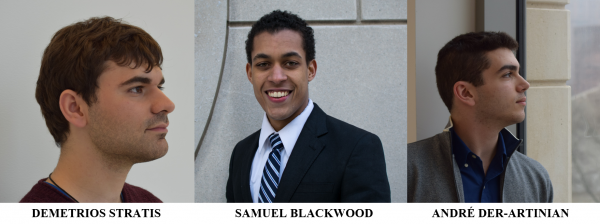Three USG Candidates, Three USG Voices
April 4, 2018
Each as united in their goals as they are different in their strategies, three candidates have announced their bids for the United Student Government (USG) presidency. The students, André Der-Artinian, Fordham College at Lincoln Center (FCLC) ’20, Demetrios Stratis, FCLC ’19, and Samuel Blackwood, FCLC ’19, are all prominent members of the Fordham community, having held positions within USG and the other branches of student government which have individually colored their ideas and dreams of the presidential office.
As a matter of fact, USG only resides within one office: G30, a small square room pressed between the office for graduate interns and the office of the Commuter Student Association (CSA) in the garden level of 140 West building. There is a pair of red plaid boxers from the 2016 Undys award ceremony tacked to the wall, an old string of letters half pinned-up over a collection of Fordham T-shirts and a few chairs tucked in near two computer desks. There is also a sword and shield–remnants from a King Arthur costume Stratis had worn for Halloween last year.
Swords in particular just so happened to be on Stratis’s mind as the campaign drew nearer. He was set on the story of Damocles. It goes like this: Damocles, a pandering courtier is offered the throne by his king who hangs a sword by a single hair above the man’s head. As time passes, Damocles becomes increasingly frightened by the possibility of the sword falling and begs the king to relinquish him of the power he believed was such a luxury. It’s a parable about duty, and Stratis is concerned with nothing if not duty.
“When you’re in a leadership position, there is an invisible sword that is always hanging over your head,” he said. “It’s a force of nature, and you have to regard your position of power with a lot of responsibility and caution because people expect you to speak for them. They expect you to fulfill certain obligations and duties, and if you find yourself very lacking in the departments or facilities necessary to achieve the things that they want to do then you can you be easily replaced.”
As a CSA senator, USG senator and finally Vice President of Operations, Stratis said that he knew that force well. Certainly, the other candidates did too.
Der-Artinian, a commuter like Stratis, had also followed a similar trajectory. Now as Treasurer and de jure chair of the Student Activities Budget Committee (SABC), he manages a quarter of a million dollars and the 55 clubs that appeal for it. “If I mess up, it’s worse than having a president that messes up,” Der-Artinian said. Budgets freeze. Funding is halted. Events get derailed.
Likewise, Blackwood has recently shouldered a considerable amount of the effort to change visitation and guest policies at the university. Elected into the office of RHA Advocacy Coordinator, he and the other club members drafted a proposal that called for the abolition of gender-binary rules, fine reductions and the acknowledgement of LGBTQ students. Currently in negotiation, the document and its outcome carry the interests–supportive or not–of a thousand residents and with them an immense weight of responsibility.
The guest pass policy, however, is only one of the projects Blackwood is tackling. The rest of them, he said, require USG. The first thing on his list is Real Talk, a regularly scheduled program of conferences covering a host of issues (racism, transphobia, homophobia, and sexism to name a few) that students can speak and reflect on. If he were elected, Blackwood said that he would work to incorporate USG into the program. “As much as I would like to think that, I can’t do everything on my own,” he said. “There’s about a thousand things that I want to do.”
Indeed, as Blackwood scrolled through his phone he rattled through a list of initiatives as diverse as they were ambitious: addressing fines and violations issues, implementing cheaper summer housing payments, increasing neighborhood outreach programs, each an unfolding arm–divisions, standing committees, collaborative efforts–under a USG nerve center.
At that center would be Blackwood, but leadership as it were is a much more complicated idea in his book. “I think a leader needs to be both a mentor and somebody who has a bird’s-eye perspective,” he said. “A lot of my experience is on empowerment.” Sitting on RHA, USG and the Student Advocacy Council, Blackwood believes that his connections to the student body and the administration further his mission in that respect. As a whole, he said that he wants to create “a community that is more understanding, a community that is more engaged and inclusive of everyone.”
Engagement is, as it turns out, Blackwood’s cause of concern. “We’re here for four years so I think people can become discouraged by what they see as an apathetic administration sometimes,” he said, but added that part of that problem is transparency. A semi-regular newsletter coupled with more consistent club outreach he thinks would be a swift step in the right direction.
Congruently, André Der-Artinian holds transparency in similar importance. In his experience, much of what is accomplished in USG is missed by the majority of students, which only pushes along a perception of the organization’s ineffectiveness. “Our success comes from our students,” he said. “If we don’t work with each other, if we don’t view each other as our colleagues, USG’s just going to be that club that people are afraid to talk to because they think we do nothing.”
Combatting that image will take more than just a strong social media presence according to Der-Artinian; it requires a reaffirmation of the motto, ‘everyone is a member of USG,’ and perhaps even a reimagining of student participation through online polling. Working perfectly, the polls would allow students to inform representatives of their opinions on certain issues, consequently rebranding an organization that has faced criticism of exclusivity in a more democratic light.
That being said, Der-Artinian noted that he still has several items on his agenda he would like to tick off: providing vegetarian and healthy alternatives in dining halls and vending machines, defanging the potentially daunting process of utilizing Career Services, working with CSA to reorganize events to be more commuter friendly and establishing designated smoking areas away from high-trafficked pathways are some of the measures at the forefront of his blueprint.
Blueprints, however, are for Demetrios Stratis, the business of architects. In his view, USG is not a firm of policymakers but rather the resources from which policy is made. Ultimately, the presidency “is not about you,” according to him. “You are not to be a gatekeeper. You’re supposed to open the gate. You’re supposed to be a lantern bearer for the rest of the people inside your community.”
For him, rethinking or, for that matter, restructuring the system is not nearly as important as learning the present one. Initially that means filling executive board positions, strengthening communications between USG and the student body and coordinating with other clubs. From there, he said, “we’re going to start attacking.”
“I think by the end of the year, everyone will know who most of the people in USG are, what we’ve done,” Stratis said. “I want ease of access, and I want more equitable things for everyone at the end of the day, and if we have a more involved student body that believes they have a stake in joining USG, then I’ve done my job. I’m proud of what I’ve done.”
True enough, Blackwood, Der-Artinian and Stratis each indicated that ultimately, they want a strong and supportive USG and that whoever can bring about that goal is the candidate most qualified for president. Whether that means fine-tuning or overhauling the organization will be debated Friday, April 6 between the three students in a conversation moderated by the outgoing USG president, Becky Song, FCLC ’18 and her vice president, Andrew Donchak FCLC ’18.
The elections for all open positions of USG will run from April 9 to 11. The fundamentals of each candidate are the same: “I want everyone to feel like we’re listening to them, like something’s being done,” Der-Artinian said. “This is about the greater issues at hand, the campus as a whole, the people as a whole,” Stratis said. “A more close inclusive, understanding, harmonious campus community. That’s my big thing. That’s what I care about,” Blackwood said.













